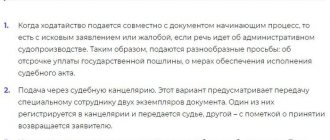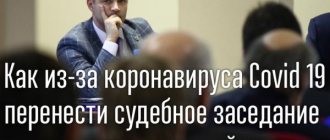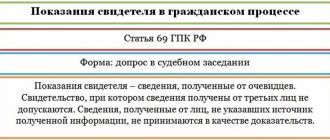1. If witnesses, experts, specialists, and translators fail to appear at the court hearing, the court shall listen to the opinion of the persons participating in the case about the possibility of considering the case in the absence of witnesses, experts, specialists, and translators, and make a decision to continue the trial or to postpone it. 2. If a summoned witness, expert, specialist, or translator does not appear at the court hearing for reasons recognized by the court as disrespectful, he may be subject to a fine of up to one thousand rubles. If a witness fails to appear at a court hearing without good reason due to a second summons, he or she may be subject to forced attendance.
Commentary on Article 168 of the Code of Civil Procedure of the Russian Federation
1. For all subjects of the group specified in the commented article (witnesses, experts, specialists, translators), attendance at a court hearing is not a right, but an obligation. This feature of their legal status, combined with the lack of legal interest in the outcome of the case, necessitates the use of a wider range of possible consequences of their failure to appear and fundamentally different criteria for the application of such consequences.
2. Part 1 of the commented article talks about two main consequences of the failure of persons assisting in the administration of justice to appear at a court hearing - the continuation of the trial in the absence of a witness, expert, specialist or translator who failed to appear and its adjournment. As a criterion for applying one of the two indicated consequences, the law establishes the possibility of considering a case in the absence of witnesses, experts, specialists, and interpreters who did not appear, and, before making a final conclusion, the court is obliged to listen to the opinion of the persons involved in the case on this issue.
3. As for the criteria for deciding the possibility of considering a case in the absence of a person who has not appeared and assists in the administration of justice, they are different for each of these subjects. Thus, in the event of a witness’s failure to appear, the court proceeds from how important his testimony is for the correct resolution of the case, whether other witnesses can report the fact in support of which the failed witness was called, and whether it is possible to ensure his appearance at the court hearing. In the event of an expert’s failure to appear at the court hearing, the completeness and validity of the expert’s written opinion and the need for his personal explanations on issues, the explanation of which is related to special knowledge in this area, are discussed (Article 79 of the Code of Civil Procedure). The absence of a specialist at the court hearing may serve as a basis for postponing the hearing of the case if, upon reading the written consultation, doubts arose about the completeness of the answer to the question raised by the court, the scientific validity of the conclusions, as well as under other circumstances that can be clarified only upon receipt of clarification and explanations personally from a specialist.
The appearance of an interpreter at a court hearing is of particular importance for two reasons: 1) the implementation of the rights of persons participating in the case, but who do not speak the language of the proceedings, depends on him; 2) consideration of the case in the absence of an interpreter, regardless of whether he was notified of the time and place of the court hearing or not, is a gross violation of procedural rules and serves as an absolute basis for the reversal of the court decision (clause 3, part 2, article 364 of the Code of Civil Procedure). These circumstances allow us to conclude that the postponement of the trial of the case in the absence of an interpreter is actually mandatory, unless there is another person at the court hearing who can carry out a complete and correct translation of testimony, explanations, statements of persons who do not speak the language in which the proceedings are conducted. legal proceedings, translation for them of testimony, explanations, statements of other participants in the process, as well as all necessary documents, including rulings and court decisions.
4. Along with the main ones (continuation of trial in the absence of a witness, expert, specialist or translator who has not appeared and its adjournment), the commented article provides for two additional consequences - the imposition of a fine and forced arrest. However, it should be noted that a fine of up to 10 times the minimum wage established by federal law may be imposed on any person assisting in the administration of justice who fails to appear at the court hearing, provided that the reason for his failure to appear is recognized by the court as valid. As for forced arrest, it can only be applied to a witness (according to the Code of Civil Procedure of the RSFSR, enforcement could also be applied to an expert) and only if he fails to appear at the second summons. The imposition of a fine on a witness, expert, specialist, translator for failure to appear at a court hearing for unexcusable reasons may be repeated. In this case, the witness is warned that if he fails to appear at the second summons, he will be forcibly brought to court by a court decision by a bailiff.
Where should the interrogation take place?
Article 90 of the Tax Code stipulates that the collection of testimony from witnesses must be carried out by the tax authority conducting control activities. At the same time, if the witness is sick, disabled or elderly, he can be questioned at his place of residence. In this situation, the Federal Tax Service recommends obtaining consent from such a witness for admission to his home.
If a witness is located geographically far from the regulatory authority that wishes to question him, the tax inspectorate may send a written order to question him to the tax authority at the place of residence or location of such a witness.
Another comment on Article 168 of the Code of Civil Procedure of the Russian Federation
1. Witnesses, experts and interpreters are summoned to court according to the rules of Art. 113 Code of Civil Procedure. According to Art. 168 of the Civil Procedure Code, the failure of duly notified witnesses, experts, specialists, and translators to appear may have various legal consequences. The testimony of a witness, an expert’s opinion, or a specialist’s consultation may have different meanings for different categories of cases, therefore, if these participants in the process fail to appear at the court hearing, the court must decide on the possibility of continuing the trial or postponing the case, taking into account the specific circumstances of the case, as well as the opinions of the persons involved in the case.
The main criteria that the court will be guided by are: in the absence of a witness - the significance of his testimony about the circumstances relevant to the consideration and resolution of the case; in the absence of an expert - doubts about the correctness of the expert’s conclusion, its scientific validity, the discrepancy between the conclusion and the assignment received; in the absence of a specialist, the importance of resolving issues requiring technical assistance; in the absence of a translator, the degree of proficiency of the persons participating in the case in the language of the proceedings. Of no small importance in all of the above situations will be the fact that there is other evidence that may be the subject of research in this case.
As a general rule, if any of the participants in the process fail to appear at the court hearing, the trial of the case is postponed, about which the court issues an appropriate ruling (Article 169 of the Code of Civil Procedure). However, the law provides exceptions to this rule. The case may be considered in the absence of a witness, expert, specialist, translator, if the persons participating in the case have submitted a request to consider the case in the absence of these persons or do not object to this (Article 166 of the Code of Civil Procedure). In this case, the court issues a ruling to continue the trial.
2. Witnesses, experts, specialists and translators are considered to be persons assisting in the administration of justice, who are summoned to court and for whom appearance in court is mandatory (Article 70, Part 1 of Article 85, Paragraph 2 of Part 4 of Article 162 , part 2 of article 188 of the Code of Civil Procedure). The sanction for failure to fulfill this procedural obligation is the imposition of a fine. A prerequisite for imposing a penalty is that the reasons for failure to appear at the court hearing are not respected. Illness of the participants in the process, being sent on a business trip, etc., may be considered as valid reasons for failure to appear at a court hearing, i.e. circumstances that do not depend on the will of the interested parties and reliably indicate the impossibility of appearing at the court hearing.
Judicial fines are imposed in the manner and amounts provided for in Art. 105 and part 2 of Art. 168 Code of Civil Procedure. In the ruling on the imposition of a fine, the court may warn the witness, expert, specialist and interpreter about the consequences of failure to appear on a second summons - repeated imposition of a fine. An additional measure of liability has been established in relation to the witness - forced arrest. The forced bringing of persons who evade appearing in court is carried out by bailiffs (Article 168 of the Code of Civil Procedure).
How does interrogation work at the tax office?
The event begins with identifying the witness. After this, you must be explained your rights and given a warning about liability in relation to testifying (refusing or avoiding answering questions, providing false information). If technical means of recording will be used during the interrogation, the interrogating officer must inform you about this and reflect this fact in the protocol.
This is followed by the immediate procedure for taking testimony and drawing up a protocol. The final stage of the event is familiarization with the protocol and its signing by a witness. Issuing a copy of the interrogation protocol to a witness is a right, not an obligation, of the tax authority.
Is it possible to refuse to testify? Yes, if such testimony can be used against the person being interrogated or his family members. This rule is enshrined in the Constitution (Article 51).
However, if the head of a legal entity is called as a witness, he cannot refer to the above provision of the Basic Law, since he does not represent himself personally, but the organization entrusted to him. Unreasonable refusal to testify entails the imposition of a fine on an individual in the amount of three thousand rubles.
Carefully read the interrogation protocol and make adjustments if necessary.
As already mentioned, the results of the interrogation are documented in a protocol, and how correctly your answers are entered into such a protocol largely determines what consequences this event will have for the taxpayer. Do not forget that your testimony is entered into the protocol by the person taking it, so he does it in a way that is beneficial to the controlling authority.
Therefore, before you put your signature on the protocol, you should carefully re-read the entire text of the document compiled (including not only the answers you gave, but also the questions asked). After all, even one word twisted by a tax officer can completely change the meaning of what you said. If your answers to questions are written inaccurately, paraphrased or distorted, the protocol contains phrases that you did not say, the written wording of the question does not correspond to what was voiced, ask the tax officer to make corrections or personally note this in the comments section (write with what wording you do not agree and indicate the ones you need).
Legal experts recommend signing the protocol on each page, and if it is printed on only one side of the sheet, crossing out the blank side to avoid reprinting the text or replacing pages of the document.
What are they usually asked about during interrogation?
Today, tax authorities have developed a certain list of questions that they ask witnesses. Knowing this list, you can pre-prepare to testify. So, what are they most likely to ask?
- About counterparties. There is a fairly wide range of information here that may be of interest to the inspector, in particular: where the counterparty is located, who is its manager, contact person, how the search for this organization took place, in what mode the interaction was carried out (telephones, email addresses, personal meetings).
- About the peculiarities of concluding contracts (how negotiations were conducted, how documents were prepared and signed, and how they were exchanged).
- On the progress of agreements (how the work was performed or the goods were delivered, who accepted it, who signed the primary documentation).
You need to be prepared for the fact that the tax inspector will use all the tools at his disposal to obtain the necessary information. These could be hidden methods of psychological pressure, or repeated repetition of the same question in different formulations. Therefore, in order not to get confused and not to say too much, we strongly recommend:
- firstly, always remain alert;
- secondly, give clear and unambiguous answers;
- thirdly, work out a uniform version of events with the counterparty in advance;
- fourthly, if imaginary or dubious transactions really took place, be sure to get advice from legal experts who will help you develop the right tactics during interrogation.







